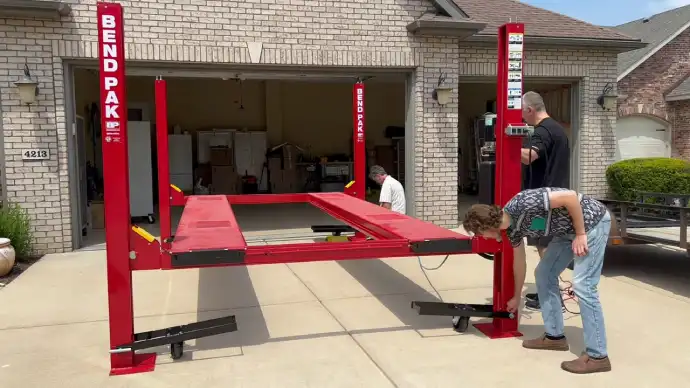Last Updated on March 14, 2023
It’s never fun to hear squeaks and groans coming from your 4-post lift. When you’ve heard these unusual noises, it’s natural to be concerned and ask yourself, “why does my 4 post lift make noise?”.
Taking a look at what could be causing these pesky sounds can help you rest assured that any maintenance or repairs needed will get you back to smooth sailing.
Potential reasons for your 4-post lift making noise include worn or damaged components, loose components, lack of lubrication, and electrical issues.
Hydraulic fluid issues, uneven flooring, excessive weight, improper installation, and environmental factors also contribute.
We’ll break down each possible cause and provide helpful advice, so you know exactly what to do about troubleshooting your lift.
Why the 4 Post Lift Make Noise: Reasons & Solutions
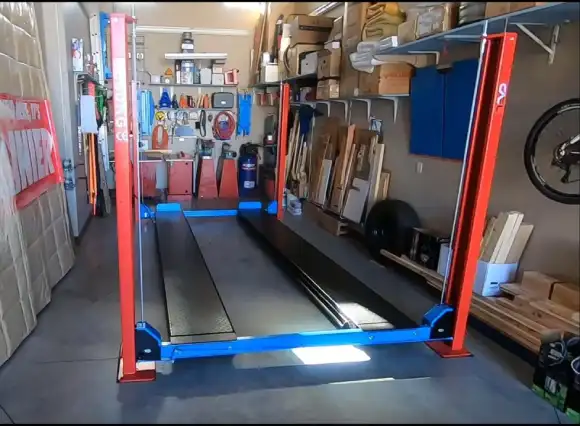
Making noise while operating can be a sign of trouble brewing with your 4-post lift. Here’s an overview of the likely causes and how to fix them before things get out of hand.
1. Worn or Damaged Components
Using a 4-post lift with worn or damaged components can cause noise during operation due to the friction between the moving parts. This can be caused by rust, corrosion, bent support beams, loose cables, and pulleys, or any other signs of wear and tear.
To reduce noise from these components, it is essential to regularly inspect the lift for any signs of damage and replace any worn-out parts. Aside from that, it is important to keep all cables and pulleys properly tightened to ensure they are not too loose.
2. Loose Components
Noise coming from a four-post lift can be caused by loose and not adequately tightened components. This could include bolts, nuts, and screws on the arms to brackets and bushings supporting the platform.
When these components are loose or not installed correctly, they can vibrate when the car is in motion, creating a loud noise.
All loose parts should be tightened down properly using the appropriate tools to fix this issue. It’s also important to check for any worn-out or missing parts that may need replacement.
3. Lack of Lubrication
Lack of lubrication on key parts of the lift will cause friction between them, leading to a loud metal-on-metal grinding sound during operation.
To avoid this issue, it is necessary to lubricate all components that require it regularly. Among these are bearings, slides, shafts, and other mechanical pieces, according to the manufacturer’s recommendations, to guarantee proper performance.
4. Electrical Issues
When electricity passes through two points with high resistance, such as wires with loose connections, it can cause arcing and sparking, which creates noise during operation.
To avoid electrical problems, inspecting all wiring for fraying or bare spots that could lead to shorts or electrical fires is important.
If any electrical components appear faulty, they should be checked by a qualified technician and replaced if needed.
5. Hydraulic Fluid Issues
Issues with the hydraulic fluid on a four-post lift can also lead to noisy operations. Oftentimes problems such as leaks, low levels of fluid, or dirty fluid can create noises as the piston moves up and down.
To fix this problem, you should first refill any leaking or low levels of fluid. You can then add a hydraulic oil conditioner to make it run smoother.
6. Uneven Flooring Conditions
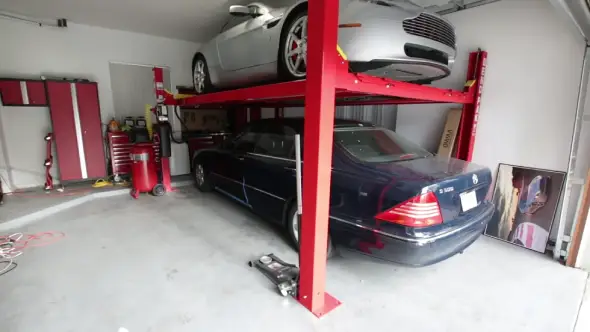
If your lift isn’t sitting evenly on the ground, it could be causing some grinding or squeaking noises when you use it. This is because the wheels aren’t properly balanced on the ground, and they’re trying to even out in order to move correctly.
To fix this issue, you’ll need to make sure that the floor is level before installing your lift and ensure that all four posts of your lift rest firmly on the ground. You may also need to adjust any of the components of the lift, such as its feet or stabilizing arms, in order for everything to fit snugly together.
7. Excessive Weight
You might also hear noise from your four-post lift if you put too much weight on it over its lifting capacity. If you overload your lift with too much weight, then it can put stress on its components and create noise during operation.
To prevent this from occurring, you should always follow the manufacturer’s recommended load limits for your lift and make sure not to exceed them.
Also, try to distribute any weight evenly across all four lift posts to reduce additional strain on any one component or post.
8. Improper Installation
If your four-post lift was installed incorrectly, then that could also lead to some extra noise when using it. This could include anything from not securing bolts tightly enough, causing them to move around while in use, or have broken parts that create friction as they move against each other.
To prevent issues due to improper installation, be sure that you hire a professional installer who knows exactly how to put together a four-post lift correctly and safely. This ensures that everything fits together correctly without any problems.
9. Environmental Factors
Environmental factors such as temperature, humidity, or dust can also cause a 4-post lift to make more noise than normal during operation.
Excessive heat or humidity can cause components to expand and contract over time, leading to increased wear and tear on the moving parts of the automotive lift.
Dust accumulation in motorized parts can also lead to increased friction levels within the system, which may cause noise when operating the lift.
To help reduce these external factors, it is important to keep your 4-post lift in a dry and clean environment and follow lift maintenance recommendations from the manufacturer.
10. Age of the Lift
The age of a 4-post lift can also have an impact on its performance as well as how much noise it makes while in use.
Over time, components will begin to wear down due to regular usage, which may create additional friction within certain parts that increase noise levels when operating the system.
If you notice your four post lift is getting noisier than usual or not performing up to par. In that case, it is important to inspect each component for potential wear-and-tear issues or consider replacing them altogether if needed.
Also, upgrading your existing 4-post vehicle lift with newer technology models may provide better sound mitigation, drastically reducing noise production when using the system regularly.
How Often Do You Need to Change Your Four-Post Lift’s Hydraulic Oil to Prevent Noise?
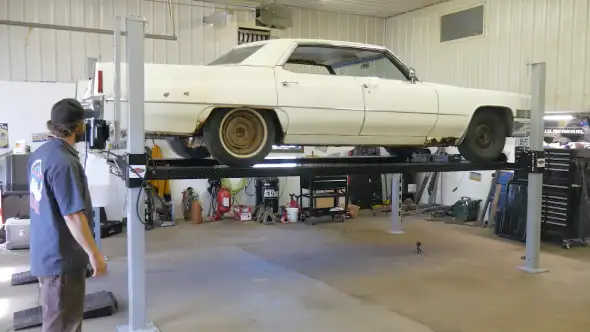
To keep your four-post lift running smoothly and prevent bothersome noise, it’s smart to stay on top of regular oil changes. A good rule of thumb is every 12 months or after 1,000 hours, whichever comes first.
Also, ensure you use a high-quality hydraulic fluid specified by the lift manufacturer for optimal results. Taking these steps will help maintain cleanliness in your system while avoiding any future issues.
How Often Should a 4 Post Car Lift Be Serviced?
The frequency at which a 4-post car lift should be serviced can vary depending on the lift model, usage, and environmental conditions. As a general guideline, it’s recommended that a 4-post lift be serviced every 12 months or after every 1,000 lift cycles, whichever comes first.
During a service, a qualified technician should inspect and lubricate all moving parts, check the lift’s electrical components, verify that the lift is level, and check the lift’s safety features.
Also, the hydraulic system should be inspected for any leaks, and the hydraulic oil level and condition should be checked and topped up or changed if needed.
It’s also essential to perform regular visual inspections and maintenance checks between services, such as inspecting the lift’s cables, hoses, and safety mechanisms and checking for any signs of wear or damage.
Diagnose & Address Lift Issues Now for Long-Term Performance Success
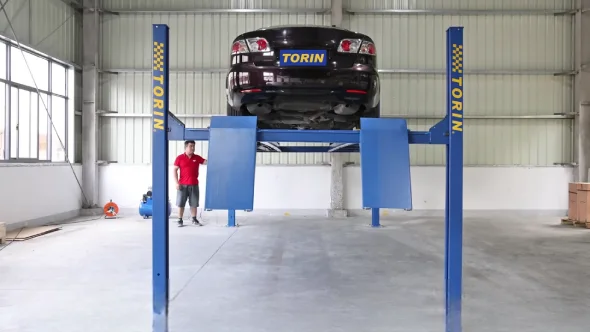
Noise coming from your 4-post auto lift is an indication that something is wrong, so it’s important to take steps to diagnose and address the issue as soon as possible.
Try checking the most likely culprits, like worn or damaged components, loosened pieces, insufficient lubrication of moving parts, electrical problems, and problems with hydraulic fluid. Perhaps there is too much weight or environmental factors at play.
Taking preventive steps like regular maintenance and keeping an eye on those loads can help ensure lasting performance from your trusty 4 post lifter for the long haul.
